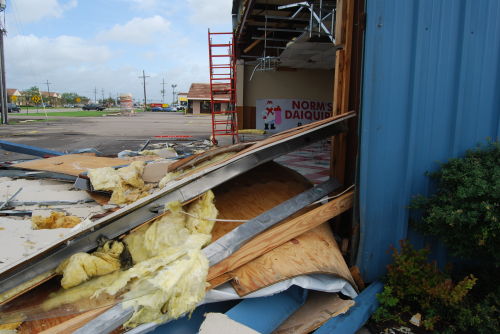CRIME BLOTTER: Reported offenses in the Tri-parish area
June 11, 2013
Lafourche officials urge storm prep
June 11, 2013Enhanced notification systems to spread the word on evacuations, a beefed-up levee system that will provide a degree of better flood protection and a continued commitment to keeping people safe are among the assets local officials have in their toolboxes as the 2013 hurricane season progresses.
So far this year, one named storm – Tropical Storm Andrea – has traveled Gulf of Mexico waters. The storm made a high-speed beeline for the Atlantic seaboard and although significant rainfall occurred in affected areas it was not a major event.
Andrea was the leading pitch, however, in a storm year that weather experts predict will be “very active.”
“The tropical Atlantic remains very warm, and we do not anticipate development of a significant El Niño,” University of Colorado hurricane guru William Gray states in his June forecast update. “Given the above-average forecast, we are calling for an above-average probability of United States and Caribbean major hurricane landfall.”
No matter how busy a season is forecast to be, emergency officials maintain, the storm that counts – whether the season yields one or 20 events – is the one that comes knocking at your back door.
Lafourche Parish officials say they are confidant emergencies can be safely handled this year, noting their past successes even in the face of devastating storms.
Emergency director Chris Boudreaux says what hasn’t changed is the need for residents to be prepared.
“Make a plan, get yourselves ready,” Boudreaux said. “Know where you are going, how to stay in touch with family and friends. If people do their part it will help us to help you.”
Boudreaux and other local officials say there are things that can be done now to cut down on the impacts of floodwaters, such as keeping trash out of yards and working with them to identify problem drainage areas.
State officials are working with local agencies to develop improvements to alert systems, Boudreaux said. But no amount of planning by governments, he and other officials maintain, can replace the life-saving effect of plans being made in individual households.
In Terrebonne Parish improvements to levee and flood gate systems are being hailed as a new line of defense, although officials warn that those changes should not alter how people prepare for a storm, or react once one is imminent.
“We certainly have more protection than we had in the past and every year we are going to have more and more,” said Terrebonne Parish President Michel Claudet. “The stubout levees to Thompson Road are going to be essential for our protection, as well as the increased height of levees along Ward 7, Grand Caillou and east Dularge.”
The Terrebonne levee plan, at the administrative level, continues having permit difficulties. But officials are working closely with the Army Corps of Engineers and other agencies.
Additions to the parish-wide plan include a hub gathering site at HL Bourgeois High School, and a protocol of picking people up from low-lying bayou communities, through help from the parish Council on Aging.
The Council is enrolling people with special needs for storm pickup and placement. Details are available at the parish Web site www.tpcg.org.
Plans have also been made for people with pets to evacuate with them.
The city of Monroe in Ouchita Parish has been designated as a shelter site for Terrebonne, and people can be accommodated there even if they travel in private vehicles.
Other state-run shelters on high ground will be available as well, including sites in the city of Alexandria.
Sandbag-filling sites in Terrebonne have been reduced, Claudet said, from 20 to 10. But he expressed confidence that those 10 sites will be effective, that they will be cared for and supplied with sand regularly.
Evacuation notifications will be made through social media as well as to landline telephones through an automatic dialing system.
People with cell phones who want to receive notifications by voice message may also register for that service at no charge on the parish Web site.
Despite levee system improvements and other services, Claudet and other officials stressed the importance of following evacuation orders.
“We have made tremendous progress in five years but we still have gaps, we have openings and until all the openings are closed and we can build them up higher, nobody should be not heeding warnings,” Claudet said. “Yes, we have done better, generally a lot of things that are done are better. But they need to go if we tell them to go.”
Reggie Dupre, director of the Terrebonne Levee and Conservation District, echoes statements of other officials, that the flood control program for the parish is still a work in progress, although significant achievements have been made.
“I would describe 2013 as a big transition year in the middle of a big transition,” he said. “We are in much better shape than we were a year or two ago. The floodgates are ready but the levees connecting these flood gates will not be ready until later this year. What will that mean if we have another Rita or Ike with a 9-foot tidal surge? You will have a slow down but you will also have what we call sheet flow coming around these structures. Nobody knows what the effect of that will be. So I am hoping we have a slow year. With a minor tropical storm or even a Category 1 we are in much better shape than we ever were. But being in the middle of this construction is still an unknown factor.”
Camps and homes in Cocodrie stand in a few feet of water following Hurricane Isaac. Residents and camp owners in the area hope levees and floodgates will leave the community unscathed this hurricane season.












